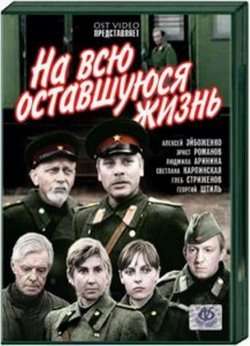For the Rest of His Life
For the Rest of His Life (Russian: На всю оставшуюся жизнь, Na vsyu ostavshuyusya zhizn) was a Soviet TV mini-series, Great Patriotic war drama, adaptation of The Train (Sputniki) novel by Vera Panova.
| For the Rest of His Life | |
|---|---|
 | |
| Written by | Boris Vakhtin Pyotr Fomenko |
| Directed by | Pyotr Fomenko[1] |
| Starring | Alexey Eybozhenko Ernst Romanov Lyudmila Arinina Taisia Kalinchenko |
| Theme music composer | Veniamin Basner |
| Country of origin | USSR |
| Original language(s) | Russian |
| Production | |
| Cinematography | Vyacheslav Babenko |
| Running time | 270 minutes |
| Production company(s) | Lentelefilm |
| Release | |
| Original release |
|
Plot
Story about the life of doctors, nurses and other personnel of hospital train during the Great Patriotic War.
Cast
- Alexey Eybozhenko as Commissar Danilov
- Ernst Romanov as Hospital train Commander Doctor Belov
- Lyudmila Arinina as Julia Dmitrievna
- Vladimir Bogin as Nikonov
- Yevgeniy Solyakov as Danya
- Maya Bulgakova as Dusya
- Grigori Gai as intendant Sobol
- Valentin Gaft as Lt. Kramin
- Kira Golovko as Sonechka
- Mikhail Danilov as Doctor Suprugov
- Mikhail Zhigalov as one-legged Captain
- Sergey Zamorev as Nizvetsky
- Valery Zolotukhin as Sasha
- Taisia Kalinchenko as Lena Ogorodnikova
- Svetlana Karpinskaya as Nurse Faina
- Panteleimon Krymov as Sukhoyedov
- Gleb Strizhenov as Kravtsov
- Margarita Terekhova as Faina and one-legged pregnant woman
- Nina Urgant as Aunt Laundry
- Georgi Shtil as Goremykin
Awards
- 1976 — Tbilisi TV Movie Festival Award
gollark: So does a binary format! We can swap bytes nowadays!
gollark: Depending on context, ZIP might actually be better.
gollark: And the lack of random access *is a flaw* for many usecases.
gollark: And tar *is* quite bad, it uses an accursuous ASCII format.
gollark: And then deleted the originals.
References
This article is issued from Wikipedia. The text is licensed under Creative Commons - Attribution - Sharealike. Additional terms may apply for the media files.